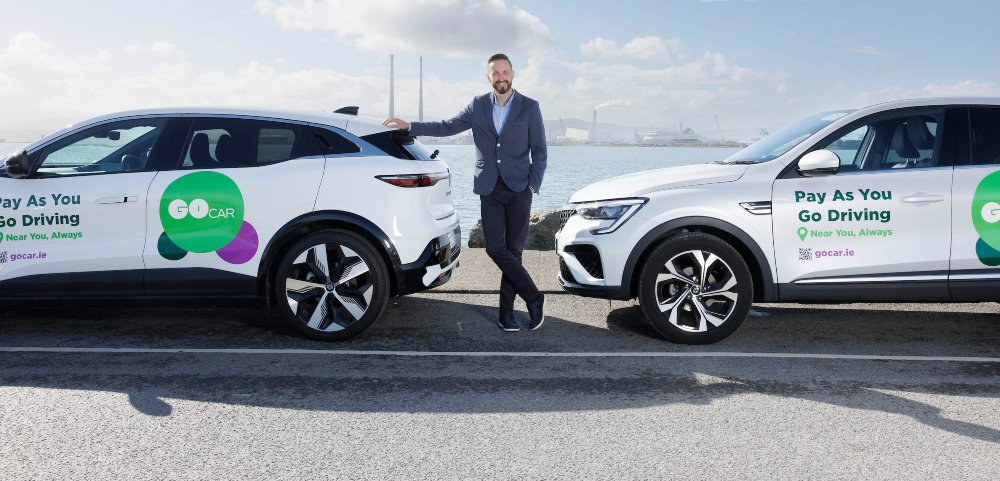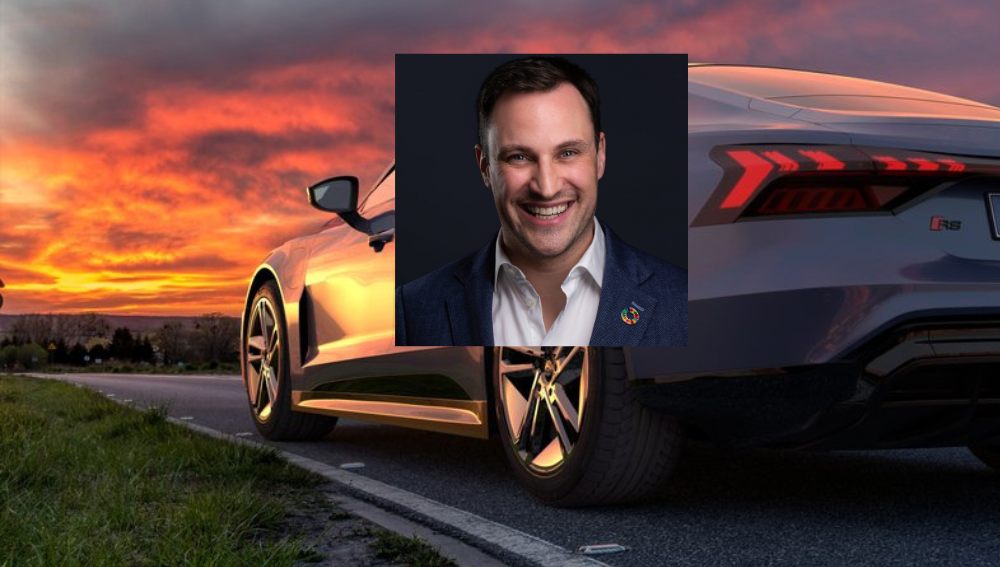Podcast Ep 241: The head of GoCar in Ireland Joe Quirke talks about the evolution of car sharing in Ireland and the role that electric vehicles will play in this future.
We spoke recently with Joe Quirke, head of GoCar in Ireland, about what’s happening in terms of transport in Ireland.
GoCar has been a prominent contributor to Ireland’s car-sharing landscape, with a fleet of more than 1,100 vehicles nationwide. Launched with the aim of providing members with the freedom of car ownership without the hassle, GoCar ensures a seamless experience.
“We’re at just over 1,100 vehicles and over the next two years we’re going to add a further 350 vehicles, depending on demand”
Fuel, insurance, and tax are all included in the rental fee, making it a cost-effective alternative to traditional vehicle ownership. Members can book vehicles through the GoCar app, unlock them using their phones, and return them to the same location after their trip.
Deals on wheels
In the space of less than a decade, the motor business landscape worldwide has been turned upside down and inside out. Traditional carmakers have had to move swiftly to embrace stricter emission standards as well as drift carefully from the world of fossil fuels to electric vehicles. At the same time European carmakers are also contenting with a veritable invasion by a slew of new Asian brands.
Added to this explosive mix is a desire by consumers to embrace a more sustainable lifestyle but also offset challenges in terms of the cost of living.
This perfect storm is changing how people view vehicle ownership and mobility in general.
As far as Joe Quirke from GoCar is concerned, it is about providing safety and choice. “We had a slow start, starting out originally in Cork city and adding vehicles on over the years. So we are now at more than 1,100 vehicles, with vans as well as cars and we are operating in every county across Ireland.”
The concept is simple. Using the GoCar app, drivers can pick a location and book a car or van afor anything from an hour up to a number of days or weeks.
“Everything is done through their mobile phone and it’s about creating that ease of use for people. Your fuel card is in the vehicle, insurance is included and the price depends on what vehicle type. We have everything from your small city type vehicle up to a more large family SUV, 7-seaters and vans.
“Our regular customers would have started out perhaps as single people originally hiring smaller vehicles and now they have changed to family life but still want to continue car sharing and opt for a larger vehicle.
“Sometimes people use them to drive to shopping centres to do the weekly shop and get the buggy in the back. As people’s needs have changed the vehicle offering has grown to include a lot of the larger SUV type vehicles and there has been great demand for the since we brought them out.”
The trend – particular for urban dwellers – to opt for vehicle sharing is a growing trend. Car manufacturing giant Toyota, for example, has begun rolling out its YUKÕ Toyota Car Club offering worldwide, including Ireland.
I ask Quirke about how the car sharing trend measures up against traditional car hire models. “We don’t target that kind of leisure tourist customer. We’re more about local communities and working within that community and with local government. The aim is help to take vehicles off the road at the end of the day. The big difference is that in Ireland to rent a car out of an airport, you need to be at least 25. Whereas car sharing is from the age of 21, so that opens up a much younger demographic. But other than that the concept is really the same. With us you can take a car for one hour whereas standard car rental is a minimum of one day.”
Destination: Mobility hubs
Keen to move the dial on the model, Quirke says GoCar is working with local councils and government to have agreed parking spaces where consumers can pick up and return vehicles.
“In Europe you have what’s called free floating car sharing where you can drop the car anywhere in the city when you’re finished with it. We’re not at that stage yet. In Ireland it is something that I would love to see trialled.”
While at first you would think electric vehicles could be an obvious contender for vehicle sharing but due to Ireland’s relatively underdeveloped electric car charging infrastructure, it is not as easy to accomplish as you might think. The key, Quirke maintains, is to have a dedicated charger for each vehicle, otherwise it won’t work.
“Our aim is to get to 20% of our fleet being electric by 2026 and we will progress from there.
“There have been a lot of challenges with electric vehicles in general, from high depreciation to the infrastructure for charging them.”
For Quirke it is a balancing act between providing what the public wants and what will be both feasible and practical. The last thing he wants to see is for someone to drop back a car with a depleted battery and for the next customer to discover it that way.
“If you have a customer who just needs a car for an hour or two, then an EV is the perfect solution for that.
“It is something we are hugely interested in and I think in terms of what the Irish Government is planning in terms of its mobility hubs over the next year or two will be key. It will certainly help us get to the next stage of bringing EVs in to the industry. There is a challenge for people to get used to EVs. Some people are the early adopters and they love them, but there are still people who are a bit afraid of change.”
He says the number of electric vehicles in Ireland are steadily increasing. So too are changing attitudes to vehicle ownership as consumers strive to play their part in climate action by utilising public transport more often.
“We did a study last year and 18% of car owners say they were open to giving up their second car. The reason most homes have two cars is because two people were working but now you have more people working at home. And cars are also one of the biggest depreciating assets you could have. The average cost of ownership of a vehicle is around €10,000 per year. The same cost of using a GoCar is around €3,000.
“So a lot of people are thinking of giving up the second car and using the savings to help with the purchase or lease of their main vehicle. That will probably help as people progress toward electric vehicles.”
Ultimately, Quirke believes if Ireland wants to reach its climate targets, public transport needs to be a more viable option. “People are starting to look a lot more at public infrastructure but it has some way to come as well. It may not be able to suit everybody’s needs. Certainly in rural areas, people are still going to own cars, that will never change.”
Looking to the future, Quirke wants to ensure that GoCar is among those viable options for people who decide to eschew full vehicle ownership or simply want a more versatile transport option. “We’re at just over 1,100 vehicles and over the next two years we’re going to add a further 350 vehicles, depending on demand.
“We have expanded a lot out of the big cities into more rural areas. We’re going to see more growth in rural locations and we’ll add vehicles where we see demand. I think when the mobility hubs start coming on board, you will have options from electric bikes and car sharing intertwined. It would be great to see some sort of an incentive from Government like a mobility allowance to encourage people to actually use car sharing.”
-
Bank of Ireland is welcoming new customers every day – funding investments, working capital and expansions across multiple sectors. To learn more, click here
-
Listen to the ThinkBusiness Podcast for business insights and inspiration. All episodes are here. You can also listen to the Podcast on:
-
Spotify
-
SoundCloud
-
Apple






